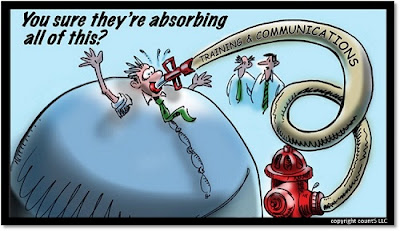 |
| Image Source: An article on LinkedIn by Linda Morales |
In the post Transitions, I alluded to I might not be posting as regularly due to the rigors of graduate school. Well that rigor came last week and this week. I'm getting my footing on homework, collaboration and time management. The faculty, staff and student body here are the picture of diversity. I've literally met people from around the globe and not once have I repeated a country on our introductions. Ghana...Korea...Iran...Saudi Arabia...Sudan...Sweden...et al and each when I said I grew up in Winston-Salem (30 minutes west on I-40) and I'm an alumni of the university, they have without fail stated: "you came home."
I re-acclimated myself to the new F.D. Bluford Library. It's much larger with three floors, the top being the quietest place to study in. The librarians said I'd be there a lot, reading the papers my professors published in journals, of which they have a lot of from American, Indian, Chinese journals as well as from professional technical societies if memory serves. The old Bluford was renamed in honor of my Chancellor Edward Fort as a research and grant center. He's still around, and teaching as well as Dr. Casterlow (my karate and calculus instructor - retired) and Dr. Sandin, who's taught at A&T since 1968. He taught Dr. Ron McNair his first physics class, as he had taught mine. After 50 years of honorable and distinguished service, he'll retire next year.
One of the things I got over quickly was being an older graduate student. I saw some during graduate orientation that at least looked distinctly older than me. No one has made me feel uncomfortable, and the chair of the Nanoengineering Department said I wasn't his oldest student (I asked). He graduated a PhD last year at the ripe young age of 63. He's working as a director in industry. There's hope.
I've joined the Nano Energy group as my research area of concentration. I interviewed the principle investigators in that and the nano-wire/photonics group before I made my decision, both areas tempting and equally interesting. I felt energy was a good fit for my industry experience, science and social interests and my inclinations to do something that makes the world a better place.
I also share Dr. Cho's ambition of getting more African Americans into batteries and by extension STEM fields: the New York Times published an article stating even with Affirmative Action, African Americans, Hispanics/Latinos lag behind all other groups since I was an undergrad. I recall 1980 was supposedly the largest number of African American males attending colleges and universities, noted again by the New York Times in a 2002 related article, observing more sadly are inmates. I speculate the impacts of globalization, adolescent pregnancies and inadequate educational resources (see NYT article, second link) keeps societal stratification darkly and remarkably intact.
The JSNN (Joint School of Nanoscience and Nanoengineering) has a "nano-bus" they use to do K-12 outreach. It's a teaching requirement for PhD students (that can also be fulfilled by grading papers or teaching a class or lab), so I volunteered. I was respectfully declined as this is my first semester, and the graduate coordinator wants us to focus on setting a good foundation to be successful. After my fire hose days, I can see the importance. When it's appropriate (i.e., I've successfully managed time and the fire hose), and for reasons I hope I've made you understand, I'll be getting on that bus.
Comments